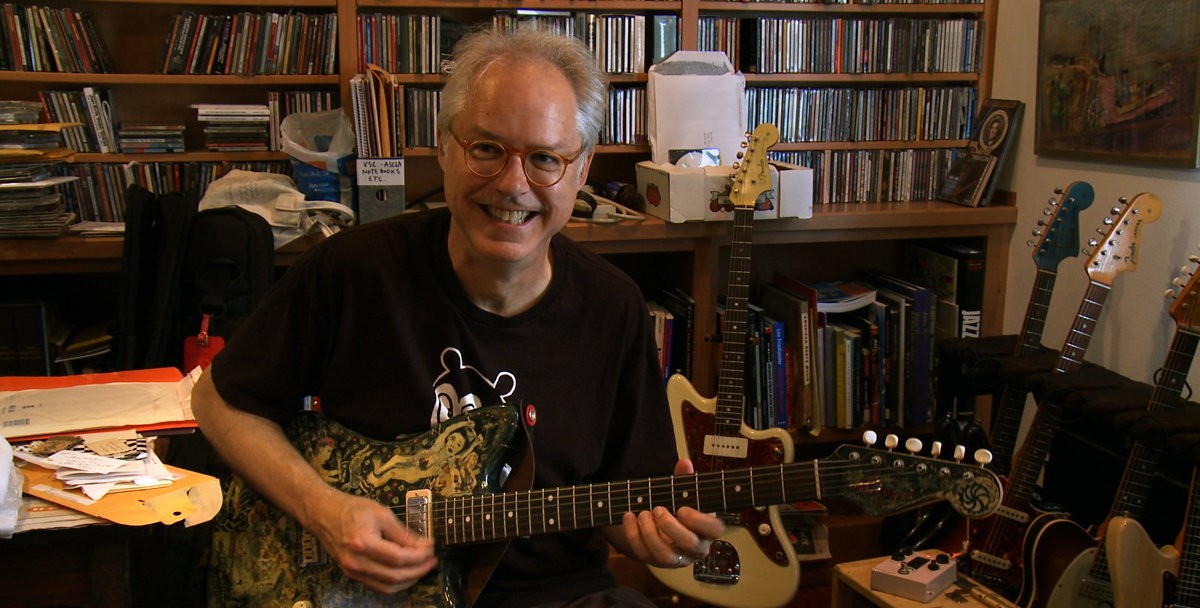In his career, Frisell has put out more than 35 solo, combo, or group albums under his name since 1983. And he’s appeared on albums by Paul Simon, Bonnie Raitt, Lucinda Williams, Rickie Lee Jones, Elvis Costello, and Allen Toussaint. In the documentary Bill Frisell: A Portrait, Simon enthuses about his “sense of tone and the way he makes color…and the different forms of music he combines.”

Drummer Joey Baron and Frisell playing with the BBC Symphony Orchestra.
Film still courtesy of Emma Franz
“I [was] interested in making a film about the ideas, artistry and approach behind great music. In this case it was Bill Frisell’s music, because his music moves me,” Franz says via email while traveling in Europe.
“He has managed to develop an original and unique voice, and does he seem interested in fame and fortune. So the film is about Bill. But in the bigger picture, about aspects of music and music practice that interest me, and which I believe are invaluable.”
The genesis for the film came when Franz approached Frisell on impulse after a gig. “I felt it would be fascinating to explore elements of his music, character and approach that make his music resonate with so many diverse audiences,” she says. “At the same time I was thinking that someone with a humble nature such as his would provide greater access to some of the more intangible aspects of high level music creation.”
Watching Frisell’s interview segments – especially those shot in his guitar/record collection room – is fascinating. At one point, he’s reluctant to show Franz the extent of his guitar collection shoved in a closet for fear of appearing too materialistic. And while holding and strumming a favorite model custom painted for him, he frets that if took it out on the road, he might scratch it. And while lamenting that he can only play one instrument at a time when he wants to do it all, the palpable joy on his face when he strums a chord is almost child-like in its unrestrained glee.
It does take a bit for the viewer to get into Frisell’s speaking cadence, full of halting starts and stops — as if thinking about and search for the right words — and side roads of discussion. To Franz, that falls right in line with his musical approach.
“I think he finds greatest focus and feels in his element when he is playing. It is a comfortable space for him. And I think that’s often why people play music or create art… to express something they can’t find the right words for,” Franz says. Throughout, Frisell is shy and very unassuming while discussing his life and music.
Bill Frisell, A Portrait - Trailer from Emma Franz on Vimeo.
“To me, Bill’s style of speaking is reflected in his music: I think of it less as halting, than a number of thoughts flowing in and out, divergent and related, sure, unsure, testing the waters and perhaps eventually clarifying something or finding more questions. Life is like that.”
Likewise, in the film Frisell says it’s hard to categorize just what he does with his instrument. “Every time I try to pin it down with words or descriptions, it limits what the thing actually [is],” he offers. “Putting words to it blocks some of the possibilities to people.”
Admittedly, this is not the most fast-paced of music documentaries. There is no biographical summary, but there are lengthy performance and rehearsal clips of Frisell playing with everything from a three piece jazz combo to a large orchestra. And it relies heavily on long stretches of talking head interviews with Frisell, members of his band, and bigger names like Simon, Raitt, jazz bassist Ron Carter, and Houston’s own piano prodigy Jason Moran, a Frisell collaborator.
As to what makes Frisell’s playing stand out from his contemporaries to her, Franz says it’s a “complicated” question, but tries to answer it anyway.
“I don’t like to speak in absolutes, because for sure there are other people who do these things, but things that stand out are nuance, sound and phrasing above being fast or complicated, wanting to be part of a bigger picture in a group context and enhance the music rather than worrying about standing out or being notice,” she says.
“I hope [audiences] come away feeling that they spent a couple of hours personally hanging out with a master and full of fresh ideas and inspiration for whatever it is that they do,” Franz sums up. And – as Bonnie Raitt says early in the effort – there is much fondness for Bill Frisell.
“He’s a unifying force among so many different musicians,” the blues woman says. “And he’s universally loved.”
Bill Frisell: A Portrait screens June 15 at 7 p.m., in the MFAH Brown Auditorium Theater, 1001 Bissonnet. $7-$9. 713-639-7550 or mfah.org/films


